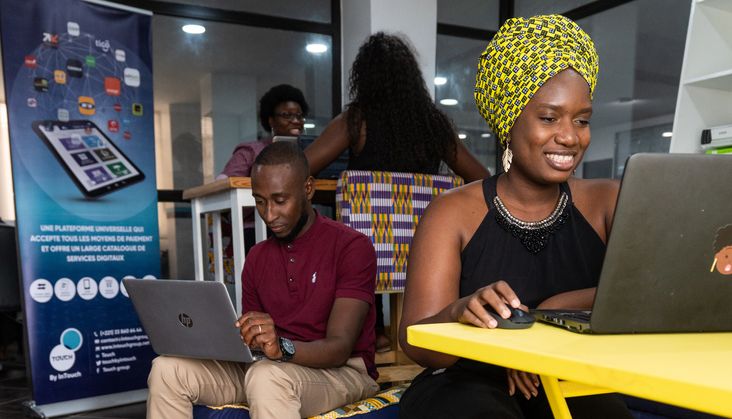Hope Rises as African Tech Startup Funding Passes $2bn Mark
The saying that Africa is the next big frontier market seems not to be patronizing as some critics would have many believe, at least not in the tech startup ecosystem where things are genuinely looking up for the continent. This is because investment into the African tech startup ecosystem almost trebled over the course of a record-breaking 2021 that saw total funding pass the US$2 billion mark for the first time.
This is according to the seventh edition of the annual African Tech Startups Funding Report released by startup news and research portal Disrupt Africa, which is available free to all as part of an open-sourcing initiative in partnership with Novastar Ventures, MFS Africa, Quona Capital, 4Di Capital, MEST Africa and Future Africa.
The report tells the story of an extraordinary 2021 in which more startups raised more funding than ever before, by quite some way. In all, 564 startups raised a combined US$2,038,627,500 in 2021. This represented incredible growth. The number of funded startups grew by 42.1 per cent to 397 in 2020, and the funding total was almost treble – up 190.6 per cent – the US$701,460,565 banked the previous year.
In all, the number of African startups securing investment has increased by 351.2 per cent since 2015. Though growth had slowed a little in 2020, partly due to the impact of the COVID-19 pandemic, investors doubled down in 2021, with the number of different investors increasing by more than 100 per cent to 771 from 370 the previous year.
Nigeria, Egypt, South Africa and Kenya remain Africa’s “big four” from a funding perspective, securing a greater share of total funding between them than in 2020, yet Nigeria soared past all other countries to take top spot, with 161 startups raising a huge combined total of almost US$800 million.

Though Nigeria and the rest of the “big four” remain clear leaders, there is still plenty of activity elsewhere on the continent, with startups backed in 24 African countries.
The fintech sector was, yet again, the most attractive to investors in 2020, with more startups securing funding than any other sector and a combined total that dwarfed all others. The sector broke the US$1 billion funding barrier, something the African tech space as a whole only managed for the first time in 2021, with fintech accounting for more than half of total investment.
Other sectors also had impressive years – notably e-commerce and retail-tech, e-health, logistics, ed-tech, energy, agri-tech and transport.
Read also :USA Investors Back Tanzanian Payments Startup NALA In $10m Seed Round
Aside from providing a full list of the funded startups, who invested in them, and, where possible, the amount raised, from the previous year, the annual reports also provide deep-dives into investment trends within key startup geographies and verticals, as well as data on African startup acquisitions.
“Momentum has been building in the African tech space for quite some time now, and 2021 will be remembered as a watershed year. Breaking not just the US$1 billion but the US$2 billion mark, creating more unicorns, and about doubling the number of active investors – it was a very good 12 months indeed. It is still just a beginning, however, and there is plenty of room for more growth,” said Disrupt Africa co-founder Gabriella Mulligan.
Previously available for sale, the African Tech Startups Funding Report was until the last edition purchased each year by leading tech companies from Africa and the rest of the world, Big Four consulting firms, banking and fintech leaders, venture capital firms, supranational investors and international trade bodies. Now, however, Disrupt Africa releases the publication for free, making it accessible to those for whom the information is most valuable – African entrepreneurs.
This year it is doing this with the help of partners Novastar Ventures, MFS Africa, Quona Capital, 4Di Capital, MEST Africa and Future Africa, with whose support Disrupt Africa will be distributing the African Tech Startups Funding Report 2021 to as many ecosystem stakeholders as possible.
“For too long access to crucial industry data such as this has been out of reach for active or aspiring entrepreneurs, as they are usually priced out of access,” said Disrupt Africa co-founder Tom Jackson. “It is the Disrupt Africa ethos to make as much information freely accessible as possible, and we can’t thank our partners enough for helping us with the open-sourcing of this publication.”
Read also :Airtel Africa Beats Dangote Cement to Become Most Valuable Company in Nigeria
“We have been investing in startups on the continent since 2014 and are encouraged by the tremendous growth of the venture ecosystem since then. Nevertheless, as startups move from proof-of-concept to scale, capital remains scarce. Disrupt Africa’s annual funding report is a critical resource for founders as they climb and navigate a capital ladder that still has missing rungs. We are delighted to partner with the team at Disrupt Africa to ensure their research is accessible to all entrepreneurs. The data and insights in the report are a vital resource, not just for charting the development of the venture ecosystem in Africa, but for supporting it,” said Steve Beck, managing director at Novastar Ventures.
MFS Africa founder and CEO Dare Okoudjou said the African tech ecosystem had experienced unprecedented growth, breaking records year after year.
“It’s the clearest indicator that we are reaching an exciting inflection point in our sector. In the last quarter of 2021, we raised US$100 million in Series funding to accelerate our growth as we make borders matter less. As such we understand the importance of the right funding to build the fundamental infrastructure needed to facilitate interoperability across payment schemes, borders, and currencies. Accurate and informative reports about the ecosystem raise the profile of our sector beyond Africa, and that interest helps to channel much-needed investments in impactful startups. We are absolutely thrilled to support Disrupt Africa on this important project,” he said.
“Quona Capital is proud to support this important work by Disrupt Africa,” said Johan Bosini, partner at Quona Capital. “We are seeing such incredible traction on many fronts of the venture ecosystem in Africa, with major milestones being achieved in large investment rounds and total quantum being invested in technology businesses across the major hubs in South Africa, Nigeria, Kenya and Egypt. We all learn and benefit from this industry data, and we are delighted to be part of this important initiative.”
Read also The Five Tech Trends That Will Dominate Business in 2022
“Once again we are very happy to support this crucial initiative. It is publications like this that help all members of the African ecosystem to get a snapshot as to how and where the industry is moving, and therefore vital to all of our businesses and teams. We cannot thank Tom, Gabriella and the team enough for the effort in putting the report together,” said Anton van Vlaanderen, partner at 4Di Capital.
Ashwin Ravichandran, managing director of MEST Africa, said he was excited to partner Disrupt Africa on this initiative because of the “massive opportunities” it draws to the continent, thereby enabling innovators to do more.
“Because of the work of organisations like Disrupt Africa, there has been a promising and encouraging increase in the data and insights on investments in Africa. This data shines a light on Africa’s burgeoning tech ecosystem while pointing the various ecosystem players towards better and more innovative ways of supporting local businesses to thrive,” he said.
“Tom, Gabriella and the Disrupt Africa team are doing important work in ensuring we have the right data when it comes to measuring the success of the African tech ecosystem. Future Africa is happy to support the Disrupt team in making sure actionable data and insights are available to founders, operators and investors looking to build the future of Africa,” said Iyinoluwa Aboyeji, managing partner of Future Africa
Kelechi Deca

Kelechi Deca has over two decades of media experience, he has traveled to over 77 countries reporting on multilateral development institutions, international business, trade, travels, culture, and diplomacy. He is also a petrol head with in-depth knowledge of automobiles and the auto industry







